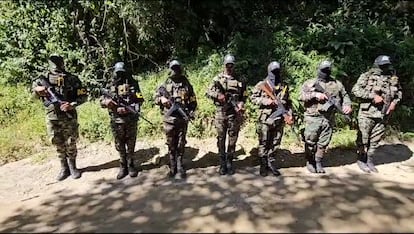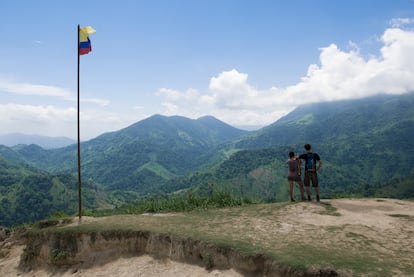The Sierra Nevada Self-Defense Forces, the armed group that controls one of the most popular tourism destinations in Colombia
The criminal organization has repeatedly tried to join the government’s dialogue processes without success. Three weeks ago, it held a public funeral for one of its commanders in broad daylight and in front of dozens of foreign tourists


On July 3, without seeking it out, a dozen foreign tourists experienced something that is not in the Lonely Planet guides: the funeral of a commander of an illegal armed group. It was 2 p.m. and we travelers were descending from the Sierra Nevada de Santa Marta, a mountain range that rises steeply from the Caribbean Sea and which is visited by hundreds of thousands of people every year. In the mud, heat, and rain, we had spent two days climbing up to the famous Ciudad Perdida (Lost City). Then, after exploring the spiritual capital of the Indigenous people of the Sierra, we spent two more days hiking back down, covered in sweat and mosquito bites. Eber Cretton, a 34-year-old Brazilian professor, recalls that we were on the last stretch of the trail, heading toward a small village called Machete Pelao from where the excursions to Ciudad Perdida depart, when he saw around 100 men dressed in military uniforms. They had ammunition belts on their backs and large rifles in their hands.
“I didn’t know what to think, I looked at my guide and it seemed to me that he didn’t know what was going on either,” says the Brazilian, now back home. Cretton says he noticed something strange about the men: their faces were covered and their uniforms did not bear a Colombian flag but the acronym ACSN. They were standing in two rows, flanking both sides of the narrow street. In the middle of it all, there was a cross and a coffin. They were the Autodefensas Conquistadoras de la Sierra Nevada (Sierra Nevada Self-Defense Forces), a guerrilla organization of which little is spoken aloud. According to experts, the group dedicates itself to extortion and providing logistical services to the cartels that export drugs along several coasts in the departments of Magdalena and La Guajira, an area known as the Caribbean trunk road. Although they have tried at times to join the process of Colombia’s plan for “total peace,” which proposes negotiating with all the country’s armed groups at the same time, so far the dialogue has not borne fruit. The ACSN are the blind spot of total peace.
Cretton says that, upon learning who was surrounding him, he felt the atmosphere become more tense. “Should we eat, should we wait? It was confusing. I didn’t want to offend them,” he recalls. Sigilfredo Camacho, our guide, admits over the phone that he was “totally freaked out.” The street was packed. Residents were standing around with the self-defense groups. Then the ceremony began.
A man dressed in camouflage fatigues, standing on the trunk of a pickup truck, took a microphone and began to speak. “We, the Sierra Nevada Self-Defense Forces, pay posthumous homage to our friend and comrade, to our Commando 27. He is gone, but he will live in our hearts,” he said in a military tone. He ordered the other armed men to get ready. Then he shouted, “What are we?” “Sierra Nevada Self-Defense Forces!” they answered. A military song struck up over a loudspeaker. When it ended, the man in the truck shouted, “shoulder arms!” The rifles went up. The commander slowly counted to three. The soldiers began firing into the sky. The noise was deafening. Several residents hurried away. The shooting lasted 10 seconds.
Two weeks after the encounter, Cretton recalls that the situation was frightening, surreal: “When they started shooting, I thought, ‘This is horrible. I hope the bullets don’t land on us.’” He says the guide, Camacho, warned him not to do anything unusual. He couldn’t eat because of his nerves. Then, a man approached Camacho and told him that the self-defense groups were going to close the road to the town, that the tourists had to leave now or stay two or three hours longer. Cretton says fleeing was a relief: “I just wanted to leave. I just wanted to get away from those men.” This is not the first time tourists have been caught in the middle of the armed group’s activities. In April 2022, 70 people had to be evacuated from the trail to Ciudad Perdida due to clashes between the ASCN and the Colombian security forces. The clashes occurred precisely in Machete Pelao.
El estado mayor de las AUTODEFENSAS CONQUISTADORAS DE LA SIERRA, expresamos nuestra profunda tristeza por la pérdida de nuestro compañero comando 27, deseamos que sus familiares encuentren consuelo en los recuerdos compartidos y el amor que los rodea. Su servicio y sacrificio… pic.twitter.com/BZFIAs49pf
— ACSN (@ACSN129068) July 3, 2024
Criminal governance
Luis Fernando Trejos is a professor and researcher at the Universidad del Norte in Barranquilla, the main city in the Colombian Caribbean. For the organized crime expert, the funeral that the ACSN held in Machete Pelao demonstrates their territorial control. In an interview with EL PAÍS, he says these self-defense groups represent the latest mutation of a line of armed organizations that “have exercised control over the Sierra Nevada de Santa Marta for more than 40 years.”
According to Trejos, the ACSN made their debut as a “political-military” group in 2020. However, he claims they are the continuation of various criminal structures that emerged in the 1960s as a group of marimberos, as people who exported marijuana were called at the time. Over the years, they have changed roles and names — they have called themselves the Autodefensas del Mamey, the Tayrona Resistance Front, the Oficina Caribe, Los Leales a Giraldo, and Los Pachenca, among others — but they have always found a way to control the region. “They fulfill state roles there. They always adapt, they are like a chameleon: they mutate, they advance, they retreat, they change to survive. They are a very resilient criminal group,” he says.
The expert explains that the social control of the ACSN is so strong that they can guarantee full security of the territory against common crime: “They fulfill police roles. That is why there is very little crime in the area.” It is this security, combined with the paradisiacal beaches and majestic mountains covered in tropical vegetation, that have made the Sierra Nevada and its surrounding area a hub for international tourism. Between Santa Marta and Dibulla (La Guajira), accommodation of all kinds abounds, from cheap hostels to five-star hotels that charge hundreds of dollars a night. Trejos says that the ACSN have been able to take advantage of that.
“They regulate all the tourist activity on the Caribbean trunk road,” he says. “The tour operator pays them to be able to develop activities, so that nothing happens to the tourists.” According to the researcher, it is not only the tourism industry that is affected by this extortion. “People pay for any business in the area: from selling red wine to selling land.”
Norma Vera Salazar, a human rights activist and security consultant in the region, explains by phone that this “neo-paramilitary” group takes advantage of the absence of the state in rural areas of the Sierra Nevada to move drugs to the coast and extort residents. According to her, in her eight years investigating the ACSN and its former structures, some 200 people on the Caribbean trunk road have reported being victims of extortion. However, she warns that “out of fear,” it is very difficult for them to admit it to the press.

Testimonies from the tourism sector
Camacho, the tour guide, agrees to a telephone interview from the village of Guachaca, a few kilometers from Machete Pelao. He has lived in different villages in the Sierra Nevada for 37 years and for more than 15 years he has been taking groups of tourists to Ciudad Perdida. He has also served as a representative of the tour guides on two occasions, for tenures lasting years. As such, he assures that he has close ties with the people who work on the trail, the peasant communities, and the Indigenous people. “I can say with full confidence that no armed group has ever asked us for anything. To other people who have other businesses, I don’t know,” he says. According to him, the funeral was held in Machete Pelao because the commander who died was from there.
He admits that sometimes the ACSN plays policing roles in the community: “They don’t want people who commit violence. When there are people hurting the community, they don’t accept it. That’s where they come in and lay down their rules.” But Camacho adds that “they don’t mess” with the community. “What I have always heard is that they only protect the Sierra so that the Gulf Clan doesn’t move in,” he says, referring to the largest criminal group in the country, heir to the former paramilitaries. There have been multiple battles between the ACSN and the Gulf Clan in the past year. According to Trejos, the self-defense groups managed to drive the Clan out of the Sierra Nevada. Now, the clashes only occur in La Guajira.
Luz Zenith Cañas Ibarra, the director of Corpeteyuna, a corporation that works for the development of tourism in Ciudad Perdida and the Sierra Nevada, also denies that the armed groups ask them for money. “It is not true. On the trail to Ciudad Perdida we don’t pay extortion. We have nothing to hide. We are open to the government, let them check us out,” she declares by telephone, adding that the funeral held in Machete Pelao is something that had never happened before. She then offers a theory as to why it took place there: “I imagine it was to make themselves known. To show everyone that they exist.”

Total peace
Like their biggest rival, the Gulf Clan, the ACSN are in a gray area with regards to total peace. “They are not involved in the negotiation, but they are not on a war footing either. At least not a declared one,” notes Trejos. Through a communiqué, the armed group stated in September 2022 they were willing to join the plan for total peace. Since then, they have published dozens of video communiqués on X in which they express their desire to negotiate with the government. A bilateral ceasefire involving the ACSN and other armed groups was established, which in theory was to last between January 1, 2023, and June 30, 2023, but it was not extended.
In January of this year, a dialogue was held in the region between members of the armed groups and representatives of the civilian population. However, the Office of the High Commissioner for Peace did not participate. At the end of February, the criminal organization announced that it wanted Salvatore Mancuso, the top living ex-paramilitary leader and recently appointed peace manager, to help them launch a peace process in the Caribbean. So far nothing has come of that request.
While the self-defense groups try to negotiate, the government seems to be working to dismantle their structure. Three leaders have been captured in recent months: “Camilo” in April, and “Muñeca” and “El Menor” in June. Despite the arrests, the ACSN insists on its desire to join the total peace roadmap. “They are among the armed groups that have made the most requests to the government to be included in the negotiations,” says Trejos. But while they remain the blind spot for total peace, the ACSN will continue to commit crimes along the Caribbean trunk road.
Sign up for our weekly newsletter to get more English-language news coverage from EL PAÍS USA Edition
Tu suscripción se está usando en otro dispositivo
¿Quieres añadir otro usuario a tu suscripción?
Si continúas leyendo en este dispositivo, no se podrá leer en el otro.
FlechaTu suscripción se está usando en otro dispositivo y solo puedes acceder a EL PAÍS desde un dispositivo a la vez.
Si quieres compartir tu cuenta, cambia tu suscripción a la modalidad Premium, así podrás añadir otro usuario. Cada uno accederá con su propia cuenta de email, lo que os permitirá personalizar vuestra experiencia en EL PAÍS.
¿Tienes una suscripción de empresa? Accede aquí para contratar más cuentas.
En el caso de no saber quién está usando tu cuenta, te recomendamos cambiar tu contraseña aquí.
Si decides continuar compartiendo tu cuenta, este mensaje se mostrará en tu dispositivo y en el de la otra persona que está usando tu cuenta de forma indefinida, afectando a tu experiencia de lectura. Puedes consultar aquí los términos y condiciones de la suscripción digital.








































